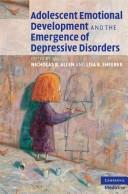| Listing 1 - 4 of 4 |
Sort by
|
Book
ISBN: 0511736878 1107197465 9786611982454 1281982458 0511464290 0511462719 0511465033 0511461968 0511551967 0511463502 Year: 2008 Publisher: Cambridge, UK ; New York : Cambridge University Press,
Abstract | Keywords | Export | Availability | Bookmark
 Loading...
Loading...Choose an application
- Reference Manager
- EndNote
- RefWorks (Direct export to RefWorks)
One of the most striking aspects of the epidemiology of depressive disorders is the rapid rise in incidence observed between the ages of 11 and 14. This book explores the developmental changes occurring during the transition from childhood into early adolescence in order to understand how vulnerability to depression develops. The focus is on emotional development, which serves to encapsulate the cognitive, sexual, interpersonal and familial changes that are occurring during this life stage. This will be an essential read for practising psychiatrists and psychologists who work with early adolescents, along with academics and researchers interested in affective science or developmental psychology and psychopathology. Other professionals working with children and adolescents, including teachers, social workers, counsellors and family practice physicians will also find this a useful summary of scientific developments that are shedding light on the vulnerabilities and opportunities particular to this critical stage of life.
Depression in adolescence --- Emotions in adolescence. --- Adolescent psychology. --- Etiology.

ISBN: 9780511551963 9780521869393 9781107406599 Year: 2008 Publisher: Cambridge Cambridge University Press
Abstract | Keywords | Export | Availability | Bookmark
 Loading...
Loading...Choose an application
- Reference Manager
- EndNote
- RefWorks (Direct export to RefWorks)
Book
ISBN: 9780521862899 9780511642197 Year: 2009 Publisher: Cambridge, UK : New York, NY : Cambridge University Press,
Abstract | Keywords | Export | Availability | Bookmark
 Loading...
Loading...Choose an application
- Reference Manager
- EndNote
- RefWorks (Direct export to RefWorks)
Mental illness --- Mental illness. --- Neuropsychology. --- Maladies mentales. --- Neuropsychologie. --- Physiological aspects. --- Psychological aspects --- Aspect physiologique --- Aspect psychologique
Book
ISBN: 1107210119 0511700172 0511640943 1282386514 9786612386510 0511641621 051163918X 0511638116 0511642199 0511640269 Year: 2009 Publisher: Cambridge ; New York : Cambridge University Press,
Abstract | Keywords | Export | Availability | Bookmark
 Loading...
Loading...Choose an application
- Reference Manager
- EndNote
- RefWorks (Direct export to RefWorks)
It is widely accepted that most psychiatric disorders are associated with cognitive impairment and that neuropsychological approaches can help unravel the mechanisms underlying brain function and help us develop a better understanding of these disorders. In this book, a panel of the world's leading experts describe the development of neuropsychological approaches to the investigation, description, measurement and management of a wide range of mental illnesses. Part One explains the rationale for examining neuropsychological processes within clinical disorders, leading into Part Two summarizing and critiquing the methodological approaches to study. Part Three covers each of the major psychiatric disorders and provides a summary of the neuropsychological findings for each condition. The final section brings together the perspectives of neuroscientists, psychiatrists and philosophers. Essential reading for all those studying the healthy as well as the disordered brain, The Neuropsychology of Mental Illness will appeal to specialists from the fields of mental health, psychology, clinical neuroscience and philosophy.
Mental illness --- Neuropsychology. --- Physiological aspects. --- Psychological aspects.
| Listing 1 - 4 of 4 |
Sort by
|

 Search
Search Feedback
Feedback About UniCat
About UniCat  Help
Help News
News